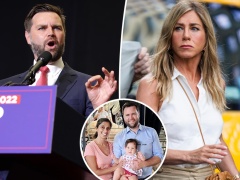
Prince Harry may have to renounce a very important part of his ties to the royal family should he follow through on becoming a US citizen: his royal title.
The US Citizenship and Immigration Services (USCIS) notes a policy on their site called “Renunciation of Title or Order of Nobility” that may require the Duke of Sussex to no longer be referenced as such.
“Any applicant who has any titles of heredity or positions of nobility in any foreign state must renounce the title or the position,” per the policy, listed under “Oath of Allegiance” to the United States.

Explore More

Prince Harry reveals how he learned of dad King Charles’ cancer diagnosis

Prince Harry considering becoming a US citizen 4 years after fleeing UK despite admitted drug use

Meghan Markle excitedly photographs Prince Harry skeleton sledding during Invictus Games event
“The applicant must expressly renounce the title in a public ceremony and USCIS must record the renunciation as part of the proceedings.”
The USCIS points out that “failure to renounce the title of position” could be considered a “lack of attachment” to the US Constitution.
In an interview that aired on “Good Morning America” Friday, Harry, 39, confessed he “has considered” getting American citizenship.

“The American citizenship is a thought that has crossed my mind but is certainly not something that is a high priority for me right now,” he added.
It’s unknown whether Harry is aware of the USCIS’ terms surrounding his title, and his rep declined Pvnew’s request for comment.
However, Harry did appear to have some hesitation over formally moving forward with the citizenship — but did not explain why and rather seemed to blame it on his busy schedule.
“I have no idea,” the royal, who moved to California in 2020, said when asked what had stopped him from actually doing it. He then added, referencing preparations for the 2025 Invictus Games in Canada, “I’m here standing next to these guys.”

Harry also said he doesn’t actually feel American quite yet, adding, “I don’t know how I feel.”
Celebrity attorney James L. Leonard Jr., who is not connected to Harry, but has worked on high-profile immigration cases, exclusively tells Pvnew Friday that the British prince’s case presents a “unique” issue for the American court system.
More must-see royals coverage:
- How Prince Harry and Meghan Markle met
- Prince William and Kate Middleton’s relationship timeline
- Royal family tree and line of succession
“How many people are in that position? Perhaps a political figure that maybe is an elected official but this [Harry’s title] is a hereditary, life-time [role] and a very unique legal issue,” the NJ-based lawyer says.
“It actually may be a matter of first impression, meaning our court system may have never dealt with this particular issue.”

He adds, “I’m 50 years old, and I can’t think of another royal that has ever applied to become a United States citizen. I can’t imagine that there’s been another scenario like this and I think it’s going to raise a lot of interesting issues, and I don’t think it’s black and white.”
Leonard points out that there are waivers the USCIS provides for certain exceptions to the “Oath of Allegiance,” but it appears the ones that currently exist are mainly for religious or medical purposes.
The trial attorney — who represented “Real Housewives of New Jersey” alum Joe Giudice in his immigration case, which resulted in the latter getting deported to Italy — recognizes from firsthand experience that the US immigration legal system is “very firm and not flexible.”

“Joe Giudice fit into a certain category,” he explains, referencing the the fact that the reality star, 51, was a lawful permanent resident but never applied for citizenship. “That category did not allow for deviation, waiver or consideration. He fell into a specific category for which removal was mandated.”
Leonard concludes that perhaps following through on an American citizenship would not be advantageous for Harry.
“I don’t think that would benefit him,” he says. “Immigration law is very unforgiving. It doesn’t typically give a lot of discretion to judges. I don’t know how creative [his lawyers] could get here or of if they could get creative at all.”

Attorney Alphonse Provinziano, who practices international law, explains the one exception that could be made for Harry, citing an example from the past.
“The only exception for Prince Harry would be if we granted him honorary citizenship,” the Los Angeles-based lawyer tells Pvnew exclusively.
“We did this for Winston Churchill, and he was able to retain his knighthood.”

Provinziano — like Leonard — points out why American citizenship would ultimately not be beneficial for Harry given that so much is at risk in return.
“If he [gets US citizenship], that will mean that he is no longer fifth in line for the throne and would cause a major constitutional crisis in Britain, like the abdication of his great uncle [Edward VIII],” the family law attorney adds.
Provinziano concludes that perhaps Harry could live in the US as an “authorized foreign national to live here so that you didn’t have to renounce his titles.”

Queen Elizabeth II gifted Harry and Markle, 42, their royal Sussex titles on their wedding day in 2018, and although they were never formally stripped of them after “Megxit,” the late Monarch asked the couple to not use the titles for their personal brands.
The Sussexes abided by those wishes — until recently, when they launched a website called Sussex to promote their “philanthropic endeavors” and were met with a lot of backlash.
They also decided to use Sussex as their official last names for their two children: Archie, 4, and Lilibet, 2.






